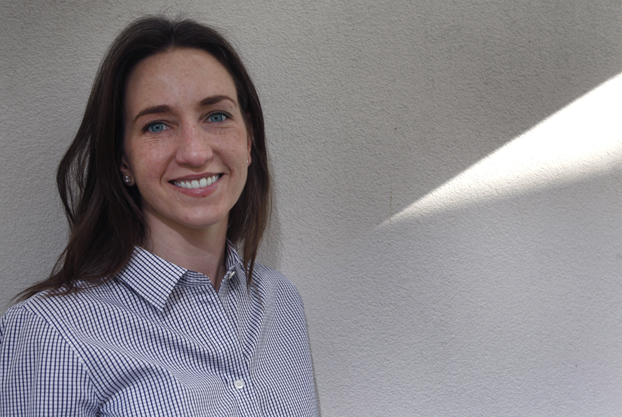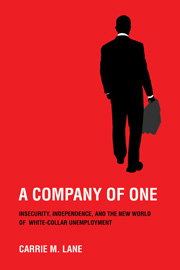 Caption: Carrie M. Lane, associate professor of American studies. Photo: Karen Tapia Download
Caption: Carrie M. Lane, associate professor of American studies. Photo: Karen Tapia Download
Layoffs in the White-Collar World
‘A Company of One’ Focuses on High-Tech Unemployment
Feb. 29, 2012
SHE DIDN'T SET OUT to study unemployment, but Carrie M. Lane ended up spending nearly a decade doing just that. As she notes in the preface to her first book, “A Company of One: Insecurity, Independence and the New World of White-Collar Unemployment” (Cornell University Press, 2011), she initially intended to write a “very different” book about corporate cultures following the dot-com crash of 2001.
Listen to the Author
Carrie M. Lane is interviewed about her book
by Patt Morrison on KPCC.
“I was curious to see whether the celebrated worker-friendly work spaces popularized by dot-com companies — complete with foozball tables, free food and irreverent, anti-hierarchical attitudes — would stick around now that so many dot-coms had failed,” said Lane, Cal State Fullerton associate professor of American studies.
“Yet, as I attended high-tech events in Dallas, I met more unemployed people than employed ones, and I became convinced that the bigger, more interesting story about high-tech employment in the first years of the 21st century was taking place outside of companies, not inside them,” she said.
So, from 2001 to 2004, Lane set out to document this new world of white-collar unemployment. She attended networking events, job fairs, and job search seminars, ultimately meeting more than 300 unemployed high-tech workers and conducting in-depth interviews with 75 of them. She then conducted follow-up interviews in 2009 to see how they had fared over time.
“For a long time, scholars believed that losing one’s job was an inherently traumatic, life-altering event, especially for white-collar male workers,” Lane said. But, the high-tech, white-collar workers she studied in Dallas “were rarely shocked or devastated by their job loss.”
High technology is a volatile field, Lane said, and few industries today are free from regular layoffs and downsizing.
“Most of the men and women I interviewed had been laid off previously, some as many as three times,” she said. “What job loss and job seeking meant for these people was something quite different from what it meant to a company man who’d intended to spend his entire career at a single company. This doesn’t mean losing a job is easy today, but it is certainly a more common, even expected event in the life of modern professionals.”
In her book, Lane argues that the workers have embraced a new definition of employment, one in which all jobs are temporary and all workers are, or should be, independent “companies of one.”
She quotes one laid-off high-tech worker, Alex, who “optimistically invoked the power of the individual to withstand — rather than oppose — such periods of hardship. ‘Things will improve,’ he said, ‘if you make opportunities for yourself. But, in the meantime, you do what you have to do.’ ”
Although Lane said she understands the appeal such individualistic, “can-do” optimism can hold for job seekers like Alex, she worries about the costs of that way of thinking.
She noted that Alex “did not rail at the company that laid him off; he did not critique the broader economic, social and economic forces that contributed to the dot-com bust or the post-9/11 recession; he did not lament the increasingly insecure nature of corporate employment.”
Instead, he held only himself accountable for his situation, and that, Lane argues, is a heavy burden to bear, especially as secure employment becomes an increasingly rare and elusive thing for American workers.
Q & A With The Author
The following are a few questions Lane recently answered:
What do students get from taking American studies courses?
I am wildly biased in assessing the relevance of American Studies because I believe so fervently that every student, every person, for that matter, can benefit from looking at their culture from a fresh perspective. Ethnographic research, which involves spending time with and interviewing members of a group, allows us to learn how other people see themselves, how they understand the world and their place in it. Doing fieldwork and reading ethnographies opens our minds, challenging and expanding our own worldviews. I think that’s an exciting process, especially for college students already actively engaged in the important work of figuring out what they believe and where they fit in the world.
What do you hope students will gain from your research and teaching on unemployment?
One of my study’s central findings is that our commitment to optimism and self-reliance can sometimes obscure the role of broader forces, such as government policies and corporate decision-making, in shaping the labor market and one’s chances therein. As students enter the job market, I hope they remember to look at both what they can do to help themselves and what others, such as their political representatives, should be doing to help create secure, meaningful, financially stable futures for this new generation of workers.
Are there any tips you’ve learned that you can offer to laid-off workers?
I’d be the last person to give advice to an unemployed person, because the academic job market works so differently than the corporate labor market. But, I do take issue with those who advise jobless workers to simply stay positive, and to think of themselves as products to be branded and marketed.
Why?
First, people are people, and I think we wander into dangerous territory when we start thinking about them as products or things. Secondly, it's not that I oppose optimism, but I think this advice ignores how much of this situation is beyond the individual's control.
Paid employment is increasingly characterized by insecurity, bouts of joblessness and the squeezing of more and more work from fewer and fewer workers. No amount of positive thinking is going to change that, and it's unfair to suggest that it is, or to pretend that people who can't find work are somehow themselves to blame.
What can be done?
I believe we need to think long and hard about what we want our country to look like. There are millions of families struggling desperately to stay afloat, both economically and emotionally, and yet we continue to accept the argument that hugely profitable companies simply can't afford to hire more workers.
If an America, with more than 12 million people out of work, isn't living up to your idea of what this country should be, then it is we — and not just the unemployed themselves — who need to do something about that.
Feb. 29, 2012
 By Carrie M. Lane
By Carrie M. Lane